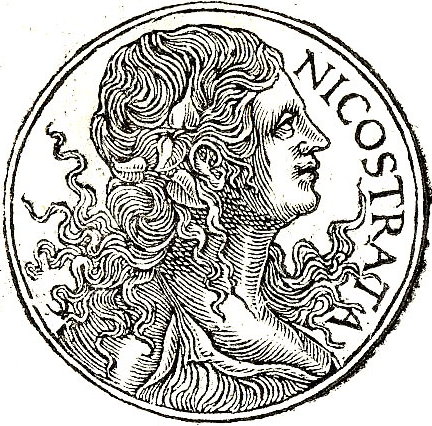Carmentis on:
[Wikipedia]
[Google]
[Amazon]
 In
In
List of Minor Roman Gods
* {{Roman religion Childhood goddesses Creators of writing systems Oracular goddesses Roman goddesses
 In
In ancient Roman religion
Religion in ancient Rome consisted of varying imperial and provincial religious practices, which were followed both by the Roman people, people of Rome as well as those who were brought under its rule.
The Romans thought of themselves as high ...
and myth
Myth is a genre of folklore consisting primarily of narratives that play a fundamental role in a society. For scholars, this is very different from the vernacular usage of the term "myth" that refers to a belief that is not true. Instead, the ...
, Carmenta (Greek) or Carmentis (Latin) was a goddess of childbirth and prophecy
In religion, mythology, and fiction, a prophecy is a message that has been communicated to a person (typically called a ''prophet'') by a supernatural entity. Prophecies are a feature of many cultures and belief systems and usually contain di ...
, associated with technological innovation, specifically, the invention or adaptation of the Latin alphabet
The Latin alphabet, also known as the Roman alphabet, is the collection of letters originally used by the Ancient Rome, ancient Romans to write the Latin language. Largely unaltered except several letters splitting—i.e. from , and from � ...
as well as the protection of mothers and children and a patron of midwives.
Background
The name ''Carmenta'' is derived from Latin ''carmen
''Carmen'' () is an opera in four acts by the French composer Georges Bizet. The libretto was written by Henri Meilhac and Ludovic Halévy, based on the novella of the same title by Prosper Mérimée. The opera was first performed by the O ...
'', meaning a magic spell, oracle or song, and also the root of the English word ''charm''. Her original name was Nicostrate (, "victory-army"), but it was changed later to honor her renown for giving oracles (Latin singular: ''carmen''). She was the mother of Evander of Pallene (fathered by Hermes) and, along with other Greek followers, they founded the town of Pallantium which later was one of the sites of the start of Rome. Gaius Julius Hyginus (''Fab. 277'') mentions the legend that it was she who altered fifteen letters of the Greek alphabet
The Greek alphabet has been used to write the Greek language since the late 9th or early 8th century BC. It was derived from the earlier Phoenician alphabet, and is the earliest known alphabetic script to systematically write vowels as wel ...
to become the Latin alphabet which her son Evander introduced into Latium
Latium ( , ; ) is the region of central western Italy in which the city of Rome was founded and grew to be the capital city of the Roman Empire.
Definition
Latium was originally a small triangle of fertile, volcanic soil (Old Latium) on whic ...
.
Carmenta was one of the Camenae and the Cimmerian Sibyl. The leader of her cult was called the ''flamen carmentalis''.
It was forbidden to wear leather
Leather is a strong, flexible and durable material obtained from the tanning (leather), tanning, or chemical treatment, of animal skins and hides to prevent decay. The most common leathers come from cattle, sheep, goats, equine animals, buffal ...
or other forms of dead skin in her temple which was next to the Porta Carmentalis, and close to the Theater of Marcellus in Rome
Rome (Italian language, Italian and , ) is the capital city and most populated (municipality) of Italy. It is also the administrative centre of the Lazio Regions of Italy, region and of the Metropolitan City of Rome. A special named with 2, ...
. Her festival, called the Carmentalia, was celebrated primarily by women on January 11 and January 15. She is remembered in ''De Mulieribus Claris
''De Mulieribus Claris'' or ''De Claris Mulieribus'' (Latin for "Concerning Famous Women") is a collection of biographies of historical and mythological women by the Florentine author Giovanni Boccaccio, composed in Latin prose in 1361–1362. ...
'', a collection of biographies of historical and mythological women by the Florentine author Giovanni Boccaccio
Giovanni Boccaccio ( , ; ; 16 June 1313 – 21 December 1375) was an Italian people, Italian writer, poet, correspondent of Petrarch, and an important Renaissance humanism, Renaissance humanist. Born in the town of Certaldo, he became so ...
, composed in 136162. It is notable as the first collection devoted exclusively to biographies of women in Western literature.
See also
* TheodontiusReferences
Primary sources
*Ovid, ''Fasti i.461-542'' *Servius, ''In Aeneida viii.51'' *Solinus, ''Collectanea rerum memorabilium i.10, 13''Secondary sources
*The Dictionary of Classical Mythology by Pierre Grimal, page 89 "Carmenta" *The Book of the City of Ladies, by Christine de Pizan, section I.33.2 *The Lincoln Beacon, Lincoln, Kansas, United States of America "Carmenta" 16 September 1880.External links
*List of Minor Roman Gods
* {{Roman religion Childhood goddesses Creators of writing systems Oracular goddesses Roman goddesses